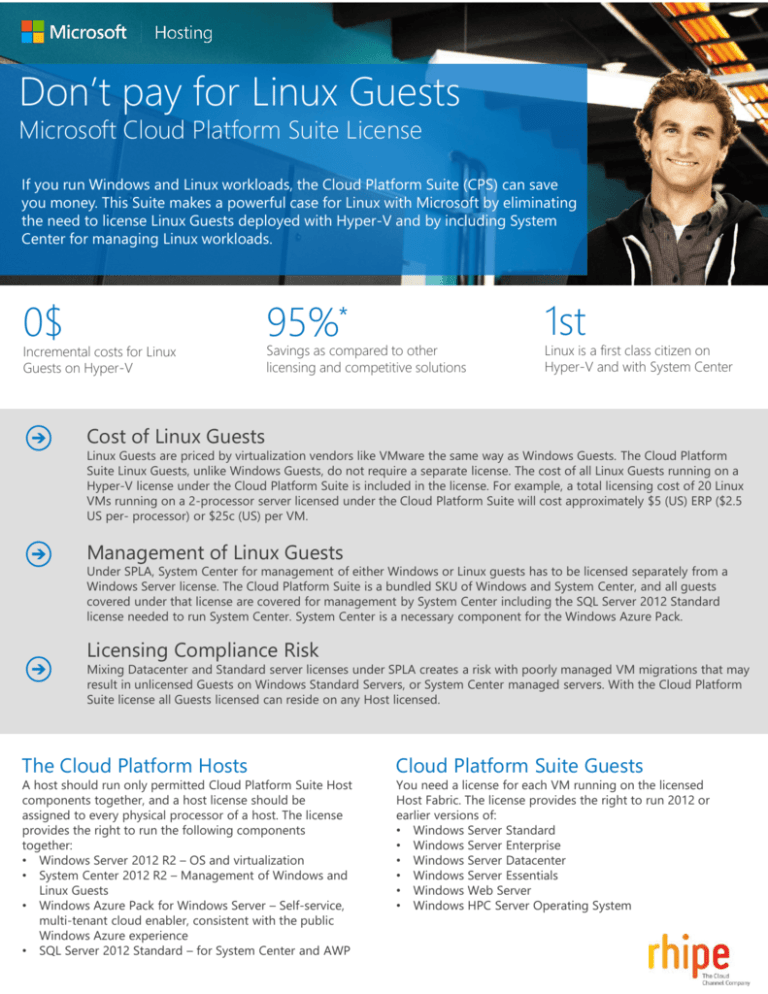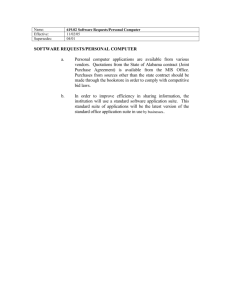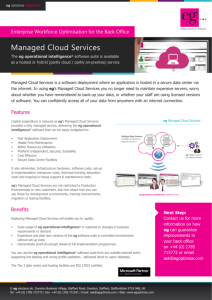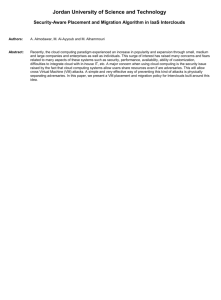
Don’t pay for Linux Guests
Microsoft Cloud Platform Suite License
If you run Windows and Linux workloads, the Cloud Platform Suite (CPS) can save
you money. This Suite makes a powerful case for Linux with Microsoft by eliminating
the need to license Linux Guests deployed with Hyper-V and by including System
Center for managing Linux workloads.
0$
Incremental costs for Linux
Guests on Hyper-V
95%*
Savings as compared to other
licensing and competitive solutions
1st
Linux is a first class citizen on
Hyper-V and with System Center
Cost of Linux Guests
Linux Guests are priced by virtualization vendors like VMware the same way as Windows Guests. The Cloud Platform
Suite Linux Guests, unlike Windows Guests, do not require a separate license. The cost of all Linux Guests running on a
Hyper-V license under the Cloud Platform Suite is included in the license. For example, a total licensing cost of 20 Linux
VMs running on a 2-processor server licensed under the Cloud Platform Suite will cost approximately $5 (US) ERP ($2.5
US per- processor) or $25c (US) per VM.
Management of Linux Guests
Under SPLA, System Center for management of either Windows or Linux guests has to be licensed separately from a
Windows Server license. The Cloud Platform Suite is a bundled SKU of Windows and System Center, and all guests
covered under that license are covered for management by System Center including the SQL Server 2012 Standard
license needed to run System Center. System Center is a necessary component for the Windows Azure Pack.
Licensing Compliance Risk
Mixing Datacenter and Standard server licenses under SPLA creates a risk with poorly managed VM migrations that may
result in unlicensed Guests on Windows Standard Servers, or System Center managed servers. With the Cloud Platform
Suite license all Guests licensed can reside on any Host licensed.
The Cloud Platform Hosts
A host should run only permitted Cloud Platform Suite Host
components together, and a host license should be
assigned to every physical processor of a host. The license
provides the right to run the following components
together:
• Windows Server 2012 R2 – OS and virtualization
• System Center 2012 R2 – Management of Windows and
Linux Guests
• Windows Azure Pack for Windows Server – Self-service,
multi-tenant cloud enabler, consistent with the public
Windows Azure experience
• SQL Server 2012 Standard – for System Center and AWP
Cloud Platform Suite Guests
You need a license for each VM running on the licensed
Host Fabric. The license provides the right to run 2012 or
earlier versions of:
• Windows Server Standard
• Windows Server Enterprise
• Windows Server Datacenter
• Windows Server Essentials
• Windows Web Server
• Windows HPC Server Operating System
Frequently Asked Questions
What is the Cloud Platform Suite?
The Microsoft Cloud Platform Suite is a new licensing offer
available for Service Providers in the SPLA channel.
How does the Cloud Platform Suite
save you money?
The Cloud Platform Suite (CPS) eliminates the need to license
Linux Guests deployed with Hyper-V and by including
System Center for managing Linux workloads. This can result
in up to 95%* savings as compared to other licensing and
competitive solutions.
How is the Cloud Platform Suite licensed?
The Cloud Platform Suite is licensed in a host plus guest
model. A customer will purchase a Microsoft Cloud Platform
Suite license for the hardware to create the host fabric in
which instances can run. This is considered the “host” license.
The customer will purchase individual Microsoft Cloud
Platform Guest licenses for each of the virtual instances that
it wants to run. A customer must license the highest number
of virtual instances that it runs in a given month. The Cloud
Platform Suite includes two SKUs:
• Host SKU: Includes Windows Server 2012 R2, System
Center 2012 R2, and Windows Azure Pack, host
capabilities and rights to manage all guests.
• Guest SKU: Includes Windows Server 2012 R2 guest
capabilities. Partners will also have access to Service
Templates for guidance on how to build their Microsoft
Cloud Platform host fabric on their own hardware.
What is a host and guest?
A Host is a physical server and a guest is an operating system
that runs on top of the host’s operating system.
How do I get the bits for the Cloud Platform Suite?
The bits for Windows Server 2012 R2, System Center 2012
R2, and Windows Azure Pack are available on the Volume
License Service Center (VLSC).
When will the Cloud Platform Suite be on the SPLA
pricelist?
The Cloud Platform Suite is currently available on the SPLA
pricelist.
What is the difference between the Microsoft Cloud
Platform Suite and the Core Infrastructure Suite?
There are two important differences between the Cloud
Platform Suite and the Core Infrastructure Suite:
• They have different licensing models. The Cloud Platform
Suite brings a new Host and Guest licensing model.
• Both are ideal for highly virtualized servers, but while the
Core Infrastructure Suite is ideal for managing a
homogeneous environment of Windows Server workloads,
the Cloud Platform Suite enables customers to manage a
heterogeneous environment running multiple server
operating systems.
Can I run the Cloud Platform Guest on a hypervisor
other than a CPS running Windows Server 2012R2
and System Center 2012R2?
No, the Microsoft Cloud Platform Guest can only be run on a
Microsoft Cloud Platform host fabric based on Windows
Server 2012 R2 and System Center 2012 R2 or future versions.
Can I move my Cloud Platform Guest from my onpremises Microsoft Cloud Platform fabric to a
Hoster’s environment?
Yes, you can move your Microsoft Cloud Platform Guest to
any Microsoft Cloud Platform host fabric, even if it is in a
third-party hosted environment.
Find the Service Provider Usage Rights at:
http://www.microsoftvolumelicensing.com/
Download the Productivity Suite Materials:
Go to our website www.rhipe.com
*As compared to a Linux guest running on Hyper-V licensed with Windows Server Standard.
© 2014 Microsoft Corporation. All rights reserved. This material is provided for informational purposes only.
MICROSOFT MAKES NO WARRANTIES, EXPRESSED OR IMPLIED.







